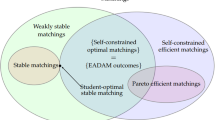Abstract
We propose a notion of core for school choice (i.e., priority-based allocation) problems. We say that a coalition of students is able to enforce a subassignment among them if, given their priorities at schools, other students together cannot exclude any student in the coalition from her assigned school. An assignment is in the core if no coalition of students can enforce any subassignment among them that Pareto improves their assignments. We show that all assignments in the core are Pareto efficient, and the assignment produced by Kesten’s efficiency-adjusted deferred acceptance algorithm is always in the core. We also propose a natural refinement of the core and show that it is equivalent to the concept of priority-efficiency proposed by Reny (Am Econ Rev 112:2025–2043, 2022).
Similar content being viewed by others
References
Abdulkadiroğlu, A., Che, Y.-K., Pathak, P., Roth, A., Tercieux, O.: Efficiency, justified envy, and incentives in priority-based matching. Am. Econ. Rev. Insights 2, 425–442 (2020)
Abdulkadiroğlu, A., Sönmez, T.: School choice: a mechanism design approach. Am. Econ. Rev. 93, 729–747 (2003)
Afacan, M.O., Aliogullari, Z.H., Barlo, M.: Sticky matching in school choice. Econ. Theory 64, 509–538 (2017)
Alcalde, J., Romero-Medina, A.: Fair student placement. Theory Decis. 83, 293–307 (2017)
Balbuzanov, I., Kotowski, M.: Endowments, exclusion, and exchange. Econometrica 87, 1663–1692 (2019). https://doi.org/10.3982/ECTA15676
Balinski, M., Sönmez, T.: A tale of two mechanisms: student placement. J. Econ. Theory 84, 73–94 (1999)
Bando, K.: On the existence of a strictly strong Nash equilibrium under the student-optimal deferred acceptance algorithm. Games Econ. Behav. 87, 269–287 (2014)
Cerrone, C., Hermstrüwer, Y., Kesten, O.: School choice with consent: an experiment, working paper (2022)
Dubins, L.E., Freedman, D.A.: Machiavelli and the Gale-Shapley algorithm. Am. Math. Mon. 88, 485–494 (1981)
Ehlers, L.: Von Neumann-Morgenstern stable sets in matching problems. J. Econ. Theory 134, 537–547 (2007)
Ehlers, L., Morrill, T.: (Il)legal assignments in school choice. Rev. Econ. Stud. 87, 1837–1875 (2020)
Ekici, O.: Reclaim-proof allocation of indivisible objects. Games Econ. Behav. 81, 1–10 (2013)
Ergin, H.: Efficient resource allocation on the basis of priorities. Econometrica 70, 2489–2497 (2002)
Gale, D., Shapley, L.: College admissions and the stability of marriage. Am. Math. Mon. 69, 9–15 (1962)
Greenberg, J.: The Theory of Social Situations. Cambridge University Press, Cambridge, MA (1990)
Huang, C., Tang, Q., Wang, Z.: Epsilon-stability in school choice. Soc. Choice Welf. 49, 277–286 (2017)
Kesten, O.: Student placement to public schools in US: Two new solutions, working paper (2004)
Kesten, O.: On two competing mechanisms for priority-based allocation problems. J. Econ. Theory 127, 155–171 (2006)
Kesten, O.: School choice with consent. Q. J. Econ. 125, 1297–1348 (2010)
Klijn, F., Massó, J.: Weak stability and a bargaining set for the marriage model. Games Econ. Behav. 42, 91–100 (2003)
Myerson, R.: Game Theory: Analysis of Conflict. Harvard University Press, Cambridge (1991)
Pápai, S.: Strategyproof assignment by hierarchical exchange. Econometrica 68, 1403–1434 (2000)
Ray, D.: Credible coalitions and the core. Int. J. Game Theory 18, 185–187 (1989)
Reny, P.: Efficient matching in the school choice problem. Am. Econ. Rev. 112, 2025–2043 (2022)
Rong, K., Tang, Q., Zhang, Y.: On stable and efficient mechanisms for priority-based allocation problems. J. Econ. Theory 187, 105014 (2020)
Roth, A.: The economics of matching: stability and incentives. Math. Oper. Res. 7, 617–628 (1982)
Roth, A., Sotomayor, M.: Two-sided Matching: A Study in Game-Theoretic Modeling and Analysis. Cambridge University Press, Cambridge (1990)
Roth, A., Postlewaite, A.: Weak versus strong domination in a market with indivisible goods. J. Math. Econ. 4, 131–137 (1977)
Shapley, L., Scarf, H.: On cores and indivisibility. J. Math. Econ. 1, 23–37 (1974)
Svensson, L.G., Larsson, B.: Strategy-proofness, core, and sequential trade. Rev. Econ. Design 9, 167–190 (2005)
Tang, Q., Yu, J.: A new perspective on Kesten’s school choice with consent idea. J. Econ. Theory 154, 543–561 (2014)
Tang, Q., Zhang, Y.: Weak stability and Pareto efficiency in school choice. Econ. Theory 71, 533–552 (2021). https://doi.org/10.1007/s00199-020-01255-3
Troyan, P., Delacrétaz, D., Kloosterman, A.: Essentially stable matchings. Games Econ. Behav. 120, 370–390 (2020)
von Neumann, J., Morgenstern, O.: Theory of Games and Economic Behavior, 2nd edn. Princeton University Press, Princeton (1944)
Author information
Authors and Affiliations
Corresponding author
Additional information
Publisher's Note
Springer Nature remains neutral with regard to jurisdictional claims in published maps and institutional affiliations.
We are grateful to the Editor Nicholas Yannelis and two anonymous referees for comments and suggestions that greatly improve the paper. We thank Ning Sun, Xiang Sun, Yu Zhou, and paticipants at Tsinghua University, The University of Macau, the 2020 Nanjing-Osaka Economic Theory Workshop, the 2020 Conference on Mechanism and Institution Design, and the SAET 2021 Annual Conference for helpful comments and discussions. This project is supported by National Natural Science Foundation of China (No. 72273085, No. 71873081, and No. 72033004).
Rights and permissions
Springer Nature or its licensor (e.g. a society or other partner) holds exclusive rights to this article under a publishing agreement with the author(s) or other rightsholder(s); author self-archiving of the accepted manuscript version of this article is solely governed by the terms of such publishing agreement and applicable law.
About this article
Cite this article
Rong, K., Tang, Q. & Zhang, Y. The core of school choice problems. Econ Theory 77, 783–800 (2024). https://doi.org/10.1007/s00199-023-01507-y
Received:
Accepted:
Published:
Issue Date:
DOI: https://doi.org/10.1007/s00199-023-01507-y




